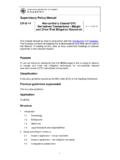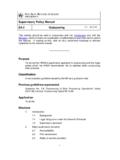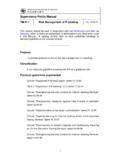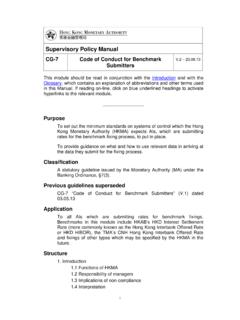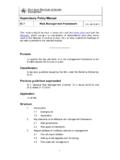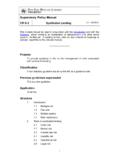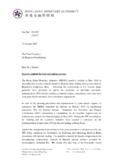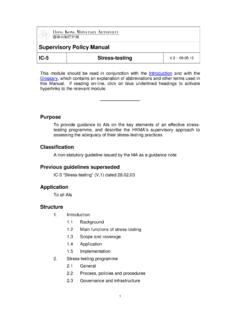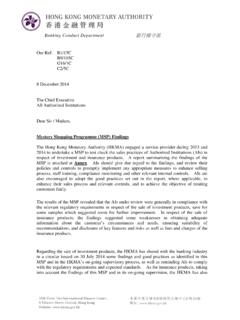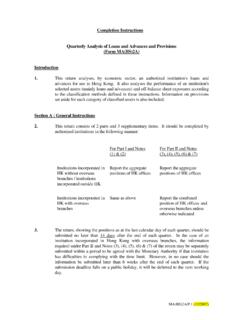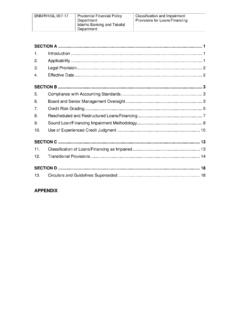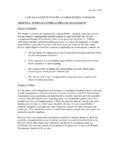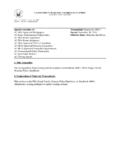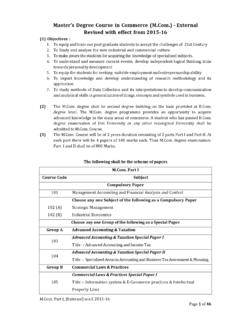Transcription of Supervisory Policy Manual - hkma.gov.hk
1 Supervisory Policy Manual IC-7 The Sharing and Use of Commercial Credit Data through a Commercial Credit Reference Agency 1 This module should be read in conjunction with the Introduction and with the Glossary, which contains an explanation of abbreviations and other terms used in this Manual . If reading on-line, click on blue underlined headings to activate hyperlinks to the relevant module. Purpose To specify the minimum standards that AIs should observe in relation to the sharing and use of commercial credit data through a commercial credit reference agency. Classification A statutory guideline issued by the MA under the Banking Ordinance, 16(10). Previous guidelines superseded IC-7 The Sharing and Use of Commercial Credit Data through a Commercial Credit Reference Agency ( dated ). Application To AIs which are involved in the provision of credit to commercial enterprises which fall within the definitions of SME Limited Companies and Unlimited Companies.
2 Structure 1. Introduction 2. Definition 3. Comprehensive participation Participation by AIs Supervisory Policy Manual IC-7 The Sharing and Use of Commercial Credit Data through a Commercial Credit Reference Agency 2 Participation by subsidiaries of AIs 4. Customer consent General Consent to disclosure from SME Limited Companies Consent to disclosure from Unlimited Companies 5. Safeguards by AIs to protect information security General Policies and procedures Scope of data to be provided to CCRA Revocation of consent by SME Limited Companies Access to CCRA database Access control Confidentiality and retention of CCRA credit data Data accuracy Requests for data access or correction Audit trail Compliance audit Staff training Providing credit data of Unlimited Companies to debt collection agencies 6. Safeguards by CCRA to protect information security General Handling of commercial credit data Limitation on the use of commercial credit data Retention of commercial credit data Maintaining commercial credit data accuracy and integrity Requests for data access or correction by SME Limited Supervisory Policy Manual IC-7 The Sharing and Use of Commercial Credit Data through a Commercial Credit Reference Agency 3 Companies Independent audit 7.
3 Complaints in relation to the sharing and use of commercial credit data 8. Hong Kong Approach to Corporate Difficulties _____ 1. Introduction A commercial credit reference agency (CCRA) is an organisation which gathers and collates information about the indebtedness and credit history of commercial enterprises and makes such information available to lending institutions. The HKMA believes that the establishment of a fully-fledged CCRA will bring about significant benefits to Hong Kong. On the one hand, a CCRA will provide AIs with a fuller picture of the credit worthiness of their corporate customers, and thus help to strengthen their credit risk management. This will be conducive to the HKMA s efforts in maintaining the safety and soundness of the banking system. On the other hand, a CCRA will improve the credit transparency of the corporate sector, thereby making it easier and quicker for borrowers to seek bank finance.
4 In view of the above benefits of a CCRA, the Hong Kong Association of Banks (HKAB) and the DTC Association (DTCA) jointly established a CCRA scheme in Hong Kong in 2004. When Phase I of the CCRA was launched in 2004, only those small and medium-sized enterprise (SME) customers which were non-listed limited companies were covered. Building on experience and market development, Phase II of the CCRA has expanded the coverage to include sole proprietorships and partnerships (generally referred to as Unlimited Companies) in 2008. Since the credit data relating to these Unlimited Companies are regarded as personal data, the sharing of such data is governed by the Personal Data (Privacy) Ordinance (the PDPO ) and the Code of Practice on Consumer Credit Data (the Code ) issued thereunder. In case Supervisory Policy Manual IC-7 The Sharing and Use of Commercial Credit Data through a Commercial Credit Reference Agency 4 of any conflict between this module and the Code in the governance of the credit data of these Unlimited Companies, the Code should prevail.
5 In the light of the latest market development and to further enhance the comprehensiveness of commercial credit data sharing, Phase III of the CCRA seeks to expand coverage through revising the definition of SME Limited Company under the CCRA scheme. The minimum authorization criterion under paragraph 10 of the Seventh Schedule to the Banking Ordinance provides that the MA must be satisfied that an AI has, among others, adequate systems of control. The MA considers that this would include adequate systems of control to enable the AI to manage its credit risk effectively, and to properly protect and use commercial credit data. In this regard, the MA will take into account the extent to which AIs make full use of all relevant information (including that obtained from a CCRA) in managing their credit exposure and whether AIs have adequate controls to ensure that their commercial credit data are properly safeguarded.
6 Failure to adhere to the standards and requirements set out in this module may call into question whether the AI continues to satisfy the relevant authorization criterion under the Banking Ordinance. 2. Definition The terms used in this module have the following meaning: Commercial credit means any credit facilities provided by an AI to and for the use of a commercial enterprise, except those types of facilities excluded from the coverage of the CCRA as specified in the Relevant Guidelines. Commercial credit data means any data concerning a commercial enterprise collected by an AI in the course of or in connection with the provision of commercial credit, or any such data collected by or generated in the database of a CCRA in the course of or in connection with the provision of a commercial credit reference service. Supervisory Policy Manual IC-7 The Sharing and Use of Commercial Credit Data through a Commercial Credit Reference Agency 5 Commercial credit reference agency (CCRA) means any person who carries on a business of providing a commercial credit reference service, whether or not that business is the sole or principal activity of that person.
7 Commercial credit reference service means the service of collecting and compiling commercial credit data and providing such data to others for the purpose of assessing commercial credit. Commercial enterprise includes, for the purpose of this module, a non-profit making or charitable organisation which obtains credits from AIs. Database , in relation to a CCRA, means the collection of commercial credit data maintained by the CCRA for the purpose of providing a commercial credit reference service. It does not include the data contained in the internal archives of the CCRA to which no persons other than the CCRA itself may have access. debt Relief Plan means an agreement to be concluded between an individual and all creditors, having an exposure to the individual, for partial relief and/or rescheduling of debts owed to those creditors pursuant to the terms of the Agreement for debt Relief Plans endorsed by the Hong Kong Association of Banks, the DTC Association and the Hong Kong Licensed Money Lenders Association.
8 Default has the same meaning as in the Glossary. Industry Associations means HKAB and the DTCA. Material default means a default in payment for a period of more than 60 days. Participating subsidiary means a subsidiary of an AI which shares and uses commercial credit data through a CCRA. Public record data , in relation to a commercial enterprise, means any information contained in official records that are publicly available, including but not limited to: Supervisory Policy Manual IC-7 The Sharing and Use of Commercial Credit Data through a Commercial Credit Reference Agency 6 (i) information relating to any action for recovery of a debt owed by the enterprise or any proceedings relating to the winding up or bankruptcy of the enterprise; (ii) information relating to the enterprise which is kept by the Companies Registry.
9 Relevant Guidelines means guidelines and circulars issued by the Industry Associations concerning the design, operation or other matters in relation to the CCRA in Hong Kong. It is important to note that these guidelines may be updated and revised from time to time. Relevant Requirements means the requirements laid down in this module, the Relevant Guidelines, IC-6 The Sharing and Use of Consumer Credit Data through a Credit Reference Agency , the Personal Data (Privacy) Ordinance ( PDPO ) and the Code of Practice on Consumer Credit Data (the Code ) issued thereunder. Scheme of arrangement means any restructuring, rescheduling or other modification of terms of whatsoever nature in relation to debts owed by an individual, whether as borrower or as guarantor, towards a single creditor or more than one creditor. SME Limited Company and Unlimited Company have the same meaning as in the Relevant Guidelines.
10 They are collectively referred to as Qualifying Companies in the Relevant Guidelines and in this module. 3. Comprehensive participation Participation by AIs As noted above, the HKMA believes that a fully-fledged commercial credit database, including both positive and negative data, will be beneficial to AIs and commercial enterprises. However, to realise such benefits, the database must be adequately comprehensive and AIs need to make full use of the database in their credit decisions. In order to enable an adequately comprehensive database to be built up, which would help AIs better manage their Supervisory Policy Manual IC-7 The Sharing and Use of Commercial Credit Data through a Commercial Credit Reference Agency 7 commercial credit exposure, the HKMA expects all AIs that are involved in the provision of commercial credit to participate as fully as possible in the sharing and use of commercial credit data through a CCRA within the framework laid down in the Relevant Requirements.
